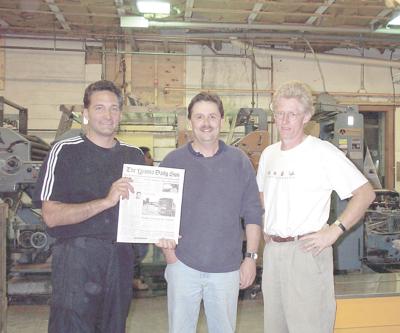(First of two parts)
LACONIA — Very early in the morning of a June day, a handful of excited people gathered at a printing plant in Conway to welcome the first copies of a thin little paper. The date was June 5, 2000, and the paper was the first issue of The Laconia Daily Sun.
Today, The Daily Sun banner enjoys sole daily coverage of the Lakes Region. Twenty years ago, though, it was only the newest voice in town, and it struggled to make itself heard.
First, struggle
Ed Engler, who is currently president of the company, said that he and partners, Adam Hirshan and Mark Guerringue, had been planning for months to launch the paper, though they kept their plans under wraps so that their entry into the marketplace would cause a stir. In the end, it barely registered a murmur.
“In retrospect, that was laughable, because nobody cared,” said Engler. “The Citizen didn’t care, nobody cared.”
All three partners had experience working in New Hampshire – but north of the Lakes Region. Hirshan and Guerringue were co-owners of The Conway Daily Sun, which disrupted the news marketplace in the Mount Washington Valley, which had been crowded with weekly publications, when they introduced a daily newspaper in 1989.
Engler had been working as the New Hampshire publisher for the Journal-Transcipt family of newspapers, which included many of the weeklies competing against The Daily Sun. When the Journal-Transcript, which was headquartered in Massachusetts, sold off its Granite State titles, Engler quit. That was late in 1999. Shortly thereafter, he was invited to lunch with Guerringue and Hirshan, who were itching to expand their business model.
Engler said several locations were discussed, but Laconia quickly rose to the top of the list.
“I think one of the givens was that it had to be someplace close enough to Conway so that Conway could print the paper, because Conway had a press. You sort of drew a circle in your mind,” Engler said.
Guerringue and Hirshan were employing a then-unusual publication strategy: a daily, local newspaper, available for free. It was a model that was pioneered out west in the early 1980s.
“The free daily newspaper model had been very successful in resort towns that had never had a daily paper, starting in the Rocky Mountains,” Engler said. That’s why they expected it to work in Conway. The Laconia paper would be the third Daily Sun, with a paper published in Berlin since 1992.
Laconia, though, broke that model. Though situated within a region known as a vacation destination, Laconia itself wasn’t a resort town. And, to make the move even more audacious, there was already an established legacy daily paper, The Laconia Citizen, which had deep roots in the community.
“It was a pretty unprecedented move,” Engler said. “How would it do in a city that was used to a daily newspaper and already had one?”
Hirshan recalled being optimistic about their chances: “We figured, they already have a daily, so they have an appetite for a daily paper. We chose to come into a market with competition by choice. We’re going to be different, we’re going to be better, we’re going to be free, so we think we can succeed.”
They knew there would be some challenges in Laconia that they didn’t face in Conway. In Conway, without any daily competition, the newsroom closed at 6 p.m., and any developments that took place in the evening wouldn’t be reported for another day. But in Laconia, The Citizen would have those stories the next day, so the news staff had to work into the night to keep up.
There was also the challenge of manpower. When the Laconia paper launched, the office included Engler as publisher, John Hourihan as editor and Ken Tatro as reporter. That was it, apart from a salesperson who worked just a few hours a week trying to sell ads.
“When we started, The Citizen had something like a dozen reporters and a roomful of editors,” Engler said.
They knew they were in for a challenge. It turned out to be even harder than they thought.
For starters, they opened the business as complete strangers to the city, partly because nobody on the staff had any local experience, and partly because they had made that decision to do all of their preparations in secret.
“It was like starting a paper on Mars. We picked a market where we didn’t know a single person. There was no one connected with The Daily Sun that knew a single person in the Lakes Region. No news contacts, no ad contacts,” Engler said.
So they were strangers to the region, and they were peddling a product people didn’t understand – local readers had been conditioned to expect to pay for daily newspapers.
“The hardest concept was trying to convince people it was free,” Engler said. That first edition had the word “free” in small type, in the spot where a paid paper, at the time, typically said something like “twenty-five cents.”
People weren’t getting the message that the paper was free, and it was painfully clear to Engler. On top of having all of the usual publisher’s duties, he was also delivering papers to the downtown area. They were only printing 2,000 papers each day, but most of those were still in the boxes when Engler brought the new edition the next morning.
“Nobody would pick up the papers because they didn’t understand it was free. Because it was a daily, they thought they had to pay for it,” Engler said. So they started printing “free” in larger and larger typeface, at one point repeating “Free” all across the top of the paper, and again, upside-down, across the bottom, in case the papers were incorrectly stocked on the rack. “So no matter what angle you looked at it, you would see the word, ‘Free’,” Engler said.
Eventually, the point was made, to the extent that people began referring to it as “The Free Paper,” and that was fine with Engler, so long as people were finally picking it up.
So, yes, the first year was harder to gain a foothold than expected. But there were several points along the way that, in retrospect, pointed The Daily Sun toward success. The first point, Engler said, was at the end of the summer of 2002. Hourihan left the paper, and Engler adopted the role of editor.
Hourihan had been a capable editor, Engler said, but from the editor’s desk, he could see an opening that The Citizen left for them. As a legacy, broadsheet daily in a relatively small market, The Citizen was a great place for ambitious young reporters to cut their teeth and build their clip files – and then get out as soon as they could land a job at a bigger newspaper.
On the other hand, The Daily Sun, a free tabloid with a pittance of paid advertising, couldn’t attract journalism school graduates or people with daily newspaper chops. Instead, Engler was able to find people whose resumes would be rejected at legacy papers, but who could write well and produce thoughtful articles. Some of those early writers who became daily reporters when hired by Engler, included Mark Smith and Michael Kitch. Ron Tunning, who served as community editor, also helped set the paper apart in the early years.
“We needed to have a more sophisticated news product in order to compete,” Engler said. “Even though we were badly outnumbered, we had really good people… Gradually, over time, people in the business community started reading the paper because our stories were good.”
The next step Engler identified as pivotal was when Adam Hirshan began working out of the Laconia office, and ended up taking over the advertising side of the business.
“We couldn’t give ads away,” Engler said about the first years of the newspaper. The only businesses who would buy an ad in the beginning were those who, for one reason or another, had a grudge against The Citizen.
Coming tomorrow: Gaining traction.


















(0) comments
Welcome to the discussion.
Log In
Keep it Clean. Please avoid obscene, vulgar, lewd, racist or sexually-oriented language.
PLEASE TURN OFF YOUR CAPS LOCK.
Don't Threaten. Threats of harming another person will not be tolerated.
Be Truthful. Don't knowingly lie about anyone or anything.
Be Nice. No racism, sexism or any sort of -ism that is degrading to another person.
Be Proactive. Use the 'Report' link on each comment to let us know of abusive posts.
Share with Us. We'd love to hear eyewitness accounts, the history behind an article.